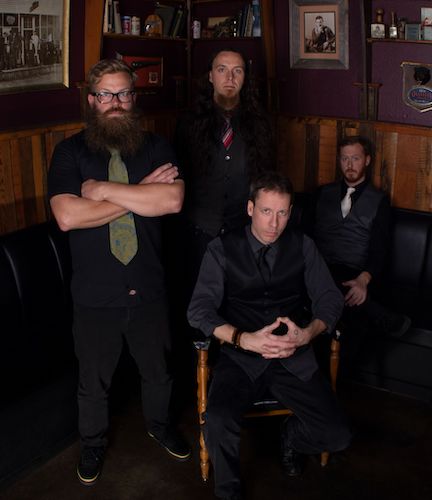
(In considering interviews, the truism applies that you can lead a horse to water but you can’t make it drink, or perhaps the other mantra applies, that it takes two to tango. In this new interview, Comrade Aleks struck a very good chord in his discussion with Adam Alexander of the fascinating Portland band Die Like Gentlemen. The horses drink deeply, tangoing occurs, it’s a very good read.)
Die Like Gentlemen is a striking name and it fits the music of this eclectic band from Portland, which combines influences drawn from sludge and progressive metal in one quite intellectual impulse. Adam Alexander (vocals, guitars, piano), Shawn Boles (drums, percussion), Matt Wieber (lead vocals, EBow) and Sean Rodgers (bass, guitars) have worked together since 2012. They started with the promising debut Romantic Delusions of Hell in 2013, and their fourth album Stories, released a year ago in the calm of January 2020, turned out to be an acoustic one.
What may we now expect from these four gentlemen of Portland? Has quarantine silenced their sonic indignation? Let’s ask Adam.
Hi Adam! How are you? How does Portland meet another wave of covid?
Hi Aleks! Like most bands, we’re frustrated that we can’t jam and perform safely right now. The Portland music scene pretty much shut down as soon as the pandemic started. Many local clubs and promoters are struggling, as I’m sure is the case everywhere. As a band, we’re just lucky that, so far, we remain healthy. We’re optimistic that 2021 will bring a vaccine and a chance for the music scene to recuperate.
Adam, Die Like Gentlemen is a title which easily sticks to memory. I failed to get it wiped out from my brain, and so here we are… Who came out with such a cool name for the band? What kind of meaning did you put into it?
In the very earliest days, before we had a name, we used to take turns passing and swigging from a bottle of whiskey while jamming. One time before getting together, Shawn Boles (our drummer) showed me some old-fashioned glasses he had just bought for the practice room so that, as he said, “We can drink our whiskey like gentlemen.” The phrase “drink like gentlemen” stuck with me, but it didn’t have enough “death” in it, so I tweaked it to “Die Like Gentlemen”.
I immediately searched to verify that no other band had that name, which was fortunately true. I really enjoyed the two most famous usages of that phrase I found: the men who stayed behind on the Titanic; and the farewell entry in the diary of Captain Robert Falcon Scott, the doomed Antarctic explorer. The ring of the name, along with the starkness of those two references, clinched it for us.
The music has always been a balance between being raw and being somewhat progressive, and I think “Die Like Gentlemen” suits that balance.
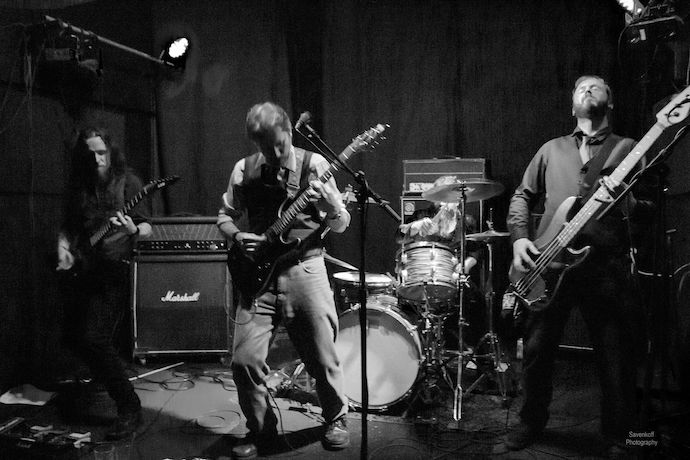
Exactly! Captain Scott! I believe the German doom band Spirit Descent had a song dedicated to him. Do you have a track dedicated to his expedition?
Not really, but the title and artwork of Romantic Delusions of Hell is inspired by both the Scott expedition as well as the ill-fated Sir John Franklin expedition to chart the Northwest Passage that saw their ships stranded in the ice: the “hell” in the album are those frozen wastelands; the romantic delusions are both the explorers and ours, so many years later, romanticizing all that suffering. True, the album contains two songs with “Hell” in the title, but they’re completely different hells.
How did you work out this combination of sludge and progressive music with a doom vibe? What are main pillars of your sound?
We just write what we write. We have a lot of related influences — classic metal, death metal, doom metal, grunge, progressive rock, etc — and we try not to write the same song twice, so we’re always dipping into different influences and inspirations to keep things fresh.
There are really too many bands that influence the material to list, but Black Sabbath is very foundational, as is classic ’70s/’80s metal in general.
Die Like Gentlemen – Drought
Speaking about lyrics… your song titles leave an impression of intellectual work – just like the track compositions themselves. But what kind of topic do you tend to choose for Die Like Gentlemen? I guess there was a little tribute towards the Dungeon and Dragons’ universe on your first album Romantic Delusions of Hell.
Heh, yes, “Lair of Zargon” is specifically about the boss monster from “The Lost City,” my favorite classic D&D module. I’m the band’s lyricist, and in general, just like with the music, I’m always trying to write about something that I haven’t specifically written about before.
Gods and monsters do come up a lot, though, because they’re fun topics for me, but it’s often a framework for more personal things in life. For instance, on the surface “Unnamed” is about Frankenstein and his monster, but it was also the first original song that started the band after a long period of musical dormancy for me, so it’s really about resurrecting music for me personally. Other times I’ll flip it: “Empty Kettle” is about an actual story of digging up my wife’s rose bushes, but I decided to frame it through the Tin Man of Oz.
Whether the topic is personal or not, I tend to do a bit of reading and research to inform the lyrics, for instance re-reading Frankenstein, reading The Tin Woodman of Oz, learning about black holes, John the Baptist, mortuary terms, etc.
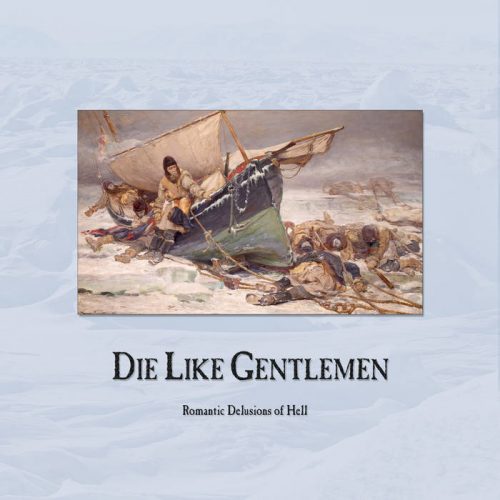
Was this album really released only on vinyl?
Yup. We have some real vinyl enthusiasts in the band, and when we were uncertain whether we’d ever do any more albums besides Delusions, they decided they wanted it on vinyl, so that’s what we did. In retrospect, it wasn’t very practical, but then all physical media is a bit impractical these days, isn’t it?
Since then we’ve stuck to CD’s (besides our one cassette EP), but we are considering releasing Stories on vinyl. We’ll see, post-pandemic.
Five Easy Lies is quite an intriguing title. Did you see this album as a conceptual one?
There was no overall concept going into the recording, but we do try to find themes in the tunes when it comes time to name an album and come up with art ideas. Lies, or specifically things not being what they seem to be, emerged as a theme, and Shawn suggested Five Easy Lies as a riff on the title of an old Jack Nicholson movie, Five Easy Pieces. The cover art we found then reflected that theme: the accepted lie of the prostitute and the client.
Die Like Gentlemen – live
Do you care if listeners understand your texts? Let’s say, do you see your lyrics as another bridge of communication between you and listeners?
I don’t think most listeners are terribly interested in lyrics in general beyond a catchy phrase here and there, and that’s totally fine, but the band and I are more concerned with making sure that we like the titles and lyrics. As a music fan, though, I like to be able to peruse an album’s lyrics in the packaging, so we pretty much always include the lyrics with our albums.
It doesn’t happen often, but it’s always an awesome feeling when you see that some people do know the words, or when they approach you after a show to discuss the meaning of a particular song.
By the way, can you name a band which you respect mostly because of their texts?
Actually, not really. I think there are great lyrics to be found everywhere, in all genres, and I tend to grab onto individual songs and lines rather than any particular artist. Morrissey, Lord Worm, Bernie Taupin, Mike Patton, George Michael … all these lyricists have churned out words of genius along with a lot that is very forgettable.
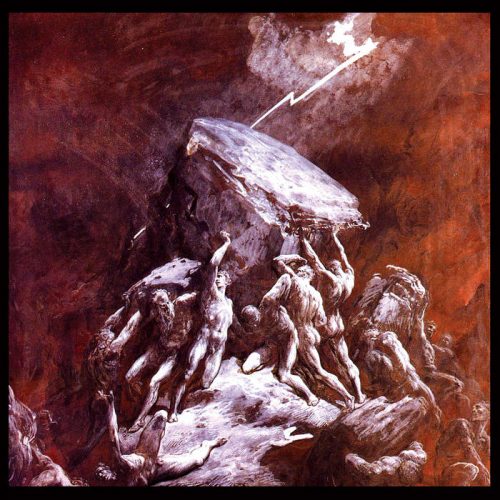
Your third album The Quickening Light appeared the next year after the Five Easy Lies release. Were you so inspired in that period or did you need to get rid of some negative states through your music immediately?
We’re pretty constantly writing, so some songs, like “Cerberus Sleeps” were already being worked on while Five Easy Lies was being mixed. “Unnamed,” as I mentioned earlier, was actually the first DLG song, and we attempted to record it for both Delusions and Lies, but we were never satisfied with the takes or the arrangement until The Quickening Light.
We’re actually in the same position now: we just released Stories, but we already have another full album of material we plan to record as soon as we’re able.
I’ve put this “negative” label on your music, but how do you see it from your point of view? Is it about expressing negativity or channeling creativity at the same time?
I guess it’s where we feel most comfortable: darkness, anger, anxiety, depression and doom. We’re very far from the first band to find freedom in dwelling on our darker aspects. In person, while we may be somewhat quiet sorts, we’re still pretty amiable guys. But when we’re composing, if a sick song can be a little sicker, a stark song a little more stark, or a fiery tune a bit more on fire, that’s the choice we’re going to make.
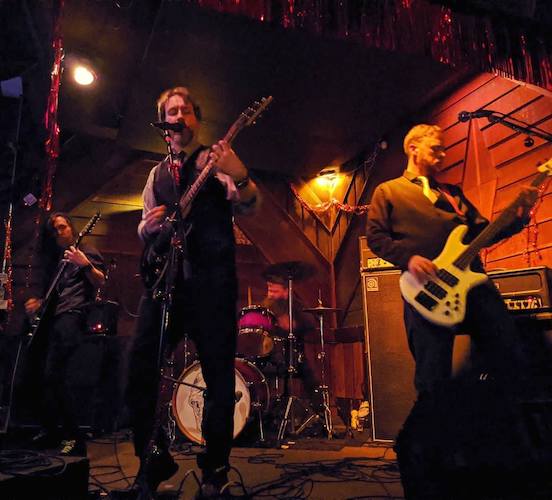
How do you see the core differences between The Quickening Light and Romantic Delusions of Hell? Did you feel it as a breakthrough back then?
Not sure about any breakthroughs … Delusions is the album we’re least happy about, recording-wise, which is typical of first albums, but each album is a snapshot of where we were at that time. I think we’re constantly getting technically better as performers with each album.
Did you record Romantic Delusions at a home studio or at a real studio? I see that you worked with Haywire Studio over the next albums, so what about first one?
The first album we recorded ourselves in our rehearsal studio. We did it mostly live, including the vocals. At the time we wanted it to be raw. After that we decided to record more piecemeal in a studio, but lately we’ve been coming back to recording live. It’s just the best way to capture the overall feel of a tune.
You’ve released albums DIY. Did you contact labels or distros in order to spread a word?
A bit, yeah, but nobody was interested! We’re not the best at networking or promoting, I’ll admit. Ultimately we’re doing this for ourselves, and we’re fortunately in a position where we can afford to record and produce the albums ourselves, as well as book ourselves around the Pacific Northwest, so why not? It’s gratifying when people dig our tunes, and it would be very nice if some label or such wanted to reach out, but until then, we’ll continue to be DIY.
Portland is well-known with its scene; do you feel a part of it? Does the fact of having a strong scene there help to promote the band or visa versa?
I’d have to say “yes” and “no”. Portland has a relatively small but dedicated heavy rock scene that is almost entirely ignored by the local press. Whenever I see lists of best Portland bands or local music compilations, it’s all indie rock with virtually no mention of anything heavy. But the heavy rock shows are well-attended by a decent-sized dedicated gang — many of whom are in their own heavy bands!
We definitely have many friends in the scene, and friend bands (like Skulldozer, Young Hunter, and Pet Weapon). We also tend to play with a wider variety of bands because we don’t easily fit into any genre description. So we’ll play with death metal bands, doom metal bands, or heavy rock bands, and pick appropriate tunes from our repertoire for that set… but it also means we don’t neatly fit into the doom metal scene, and sometimes I think that hampers us. (Plus the fact that we’re not great at promoting.)
So the short answer is that the Portland music press does very little to help us, but there is a vibrant and supportive heavy music scene that is great to have, however well we do or don’t fit into it.
Then what’s your experience playing live outside Portland? Did you tour in other States?
We tend to prefer playing the smaller towns because they really appreciate a tight, well-honed band. When you play other bigger cities, you’re just another small fish in a different big pond.
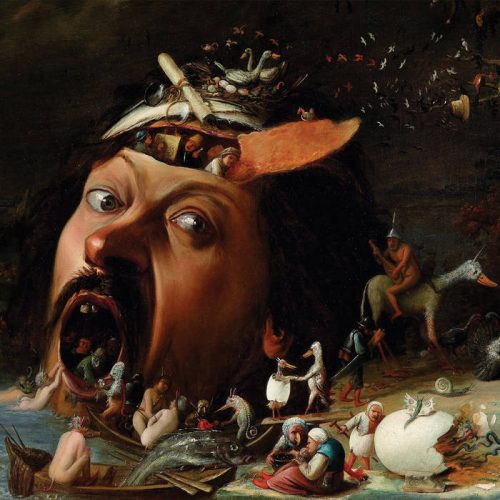
How did it happen that your next album Stories turned out to be an acoustic one? It sounds very natural for the band, but still it’s unusual.
For some variety, we started doing acoustic shows back in 2016, with acoustic versions of some of our heavy tunes as well as some covers (like Slayer, Black Sabbath, Soundgarden, and others). It was a way to re-explore some of our existing material in a new way, and gave us all another musical outlet without actually having to form a new group: in essence, it became a band-within-a-band.
These gigs were so fun and so well-received that we started writing some material specifically for it. Eventually we realized we had enough material for a full album and decided to record it.
Playing smaller, quieter venues and material also allows us to reach entirely new people who wouldn’t otherwise hear us, and when we’re lucky, those new fans then come to a heavy show and become converts of the loud stuff.
When did you play a gig the last time?
It was actually our album release show for Stories back in January of 2020. Also very DIY, we rented the spacious studio in which we recorded the album, solicited a couple opening performers, and were able to pack the place. We were also able to have the flautist and cellist who performed on the album join us for their respective songs, so that was fulfilling. We had planned a string of acoustic dates throughout the Pacific Northwest in support of the new album, but then the pandemic hit and everything was scrapped. Still, it was at least a great last show before our enforced hiatus!
Hopefully 2021 will see us rehearsing again, performing again (both heavy and acoustic), and recording our next album, tentatively titled Hard Truths.
What about Hard Truths? Die Like Gentlemen’ style tends to develop from album to album; what may we expect this time?
We’ve been focusing more on uptempo tunes of late. Less Sabbath and more Metallica (or Opeth or Mastodon or whomever). Still sludge but a bit more aggressive.
Is the title connected with all those things that have happened with the US during 2020? You’ve had quite emotional elections besides the regular Covid-panic.
Actually, the working title was picked out back in 2019 as a heavy counterpart to Stories. There are some songs, though, that are influenced by the current American and world political and social climate. There’s always so much material in the world to drive dark songwriting, but these days it seems there’s more than ever.
Thank you for the interview Adam! I wish you and the band all the best in the forthcoming year. Good luck with spreading Hard Truths!
Thanks for reaching out, Aleks! This was fun.

This is the water, and this is the well. Drink full, and descend. The horse is the white of the eyes, and dark within.
🙂
FYI Bandcamp link sends you to this NCS page.
Thanks very much. I have fixed that.